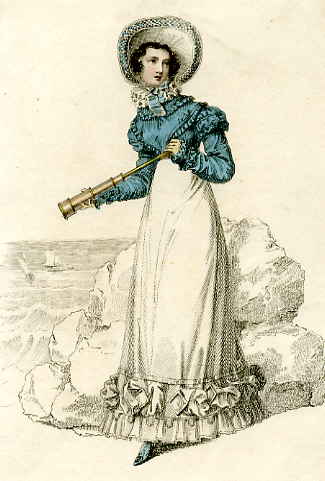
The very first reference to a bathing machine was in 1721 when Nicholas Blundell wrote of “a conveniency for bathing in the sea” and the first image is in a picture of the beach at Scarborough by John Settrington in 1735 where two different types of ‘machine’ are being drawn in and out of the sea by horses (or perhaps donkeys). A detail is shown above.
 In 1753 there was the first use of the term “bathing machine”. This was applied to the improved version devised by Benjamin Beale at Margate. This had a canvas hood on hoops that could be let down on the seaward side of the machine allowing bathers a private space to swim unobserved. One can be seen billowing like a cloud from the machine depicted on a souvenir flask.
In 1753 there was the first use of the term “bathing machine”. This was applied to the improved version devised by Benjamin Beale at Margate. This had a canvas hood on hoops that could be let down on the seaward side of the machine allowing bathers a private space to swim unobserved. One can be seen billowing like a cloud from the machine depicted on a souvenir flask.
Not every seaside resort adopted the Beale type of machine and many had no hood or protection for the modesty of the bather at all, as can be seen in this image of an apprehensive lady being guided down into the sea by two dippers. She may well look apprehensive – not only are they about to plunge her vigorously under the water but this is the chilly sea off the Yorkshire coast – probably Scarborough again. (From The Costume of Yorkshire by George Walker 1814).
The bathing machine persisted in use right through the 19th century and into the twentieth up to the 1920s, although with the adoption of bathing costumes that managed to combine a reasonable degree of decency with functionality for swimming, the modesty hood vanished. This image from the 1880s shows the beach at Cromer with ranks of machines drawn up on the sand. 
Many people regarded the ban on mixed bathing, prevalent in most resorts, as outdated and prudish, especially as British resorts were losing ground to more sophisticated Continental seaside towns where mixed bathing was the norm. In Dieppe there were elegant striped changing tents and gradually variations on these lightweight beach shelters displaced the bathing machine, making a drier, more comfortable place for the whole family to change and shelter. These are at Bexhill on Sea in 1919.
These are at Bexhill on Sea in 1919.
The first beach huts as we would recognise them today were erected at Felixstowe in 1895. They were called ‘tents’ but were actually wooden. A guidebook of 1919 explained that they “…serve[d] as snug and pleasant rooms where one could work, read or dream in the shade, close to the sea.”
At Bournemouth in 1908 the Undercliff Drive was created and a row of huts, ten feet square, for day use was built by the town council. They called them ‘bungalows’ and advertised them as providing families with “a storeroom for books, spades, pails and all the impedimenta of seaside life and facilities for simple meals.” They had glazed front doors and a sitting area sheltered under the overhang of the roof. They lined the promenade with a wide walkway before the beach, where traditional bathing machines continued to be drawn up.
From then on the beach hut as we know it today developed. Many were built by the municipality, and came with numerous rules and regulations, but some were constructed privately, especially where there were areas of foreshore with unclear ownership. In some cases they spread, unchecked – the origins of the little community of Jaywick Sands in Essex where many of the little bungalows, even today, show a close resemblance to overgrown beach huts.
Below are the famously colourful huts at Wells Next the Sea in Norfolk, sheltering against the pine trees on the dunes.

Bathing huts are iconic features of the British seaside resort and yet, even when they are municipally owned or controlled, they manage to have such individual characteristics and personalities, reflecting the fantasies and secret worlds of their occupants. They were the ideal setting for a collection of beach-read novellas I contributed to with five writer friends. Beach Hut Surprise gives six glimpses into the beach huts of Little Piddling, a South Coast resort from the Edwardian era to the present day.


 The image above is from La Belle Assemblée for October 1809 and shows ‘Sea Coast Promenade Fashion.’
The image above is from La Belle Assemblée for October 1809 and shows ‘Sea Coast Promenade Fashion.’ Somewhat later – I do not have a date for this, but it is c1820 – is this ‘Walking Dress’ from Ackermann’s Repository. I can’t help feeling that this lady is looking positively shifty as she readies her telescope.
Somewhat later – I do not have a date for this, but it is c1820 – is this ‘Walking Dress’ from Ackermann’s Repository. I can’t help feeling that this lady is looking positively shifty as she readies her telescope.




 What did one wear to get to and from those bathing machines? The ever-inventive Mrs Bell produced a magnificent ‘Sea Side Bathing Dress’ for the August 1815 edition of La Belle Assemblée. This is not the costume for entering the sea but for wearing to get there, and it is lavishly trimmed in drooping green, presumably to imitate seaweed. Note the bag she is carrying. This contains Mrs Bell’s ‘Bathing Preserver’ which she produced in 1814. You can see it in its bag again below (La Belle Assemblée September 1814). Here the lady is wearing ‘Sea Side Morning Dress’ with ‘Bathing Preserver. Invented & to be had exclusively of Mrs Bell, No.26 Charlotte Street, Bedford Square.’ The Preserver is in the bag lying beside her chair.
What did one wear to get to and from those bathing machines? The ever-inventive Mrs Bell produced a magnificent ‘Sea Side Bathing Dress’ for the August 1815 edition of La Belle Assemblée. This is not the costume for entering the sea but for wearing to get there, and it is lavishly trimmed in drooping green, presumably to imitate seaweed. Note the bag she is carrying. This contains Mrs Bell’s ‘Bathing Preserver’ which she produced in 1814. You can see it in its bag again below (La Belle Assemblée September 1814). Here the lady is wearing ‘Sea Side Morning Dress’ with ‘Bathing Preserver. Invented & to be had exclusively of Mrs Bell, No.26 Charlotte Street, Bedford Square.’ The Preserver is in the bag lying beside her chair.








 ‘There is a bonnet here I thought might suit you, Miss Gatwick,’ he confesses, remembering to address her properly and not by her given name as he always thinks of her. ‘You see? That one on the stand.’
‘There is a bonnet here I thought might suit you, Miss Gatwick,’ he confesses, remembering to address her properly and not by her given name as he always thinks of her. ‘You see? That one on the stand.’

 Emily gives him a beaming smile, much restored by thoughts of shopping, as they reach the circulating library. Porrett, having established that the monthly subscription is eight shillings, deals with the business side, taking out a subscription for both senior ladies. He also subscribes for himself, for he has a secret penchant for poetry and intends to take a slim volume off to the garden where he can brood on his heartache in peace. (Above, the artist of a Regency ‘bat print’ bowl has caught Porrett immersed in his poetry next to a beehive.)
Emily gives him a beaming smile, much restored by thoughts of shopping, as they reach the circulating library. Porrett, having established that the monthly subscription is eight shillings, deals with the business side, taking out a subscription for both senior ladies. He also subscribes for himself, for he has a secret penchant for poetry and intends to take a slim volume off to the garden where he can brood on his heartache in peace. (Above, the artist of a Regency ‘bat print’ bowl has caught Porrett immersed in his poetry next to a beehive.)


 ‘I would be honoured, my lady. And, as it is such a pleasant day, perhaps you would care for a stroll along the main shopping streets?’ asks Porrett, in a seventh heaven. ‘I believe that Master Arthur has forgotten his hammer for extracting rock samples, so that could be purchased.’
‘I would be honoured, my lady. And, as it is such a pleasant day, perhaps you would care for a stroll along the main shopping streets?’ asks Porrett, in a seventh heaven. ‘I believe that Master Arthur has forgotten his hammer for extracting rock samples, so that could be purchased.’
 The first footman, two more footmen, two maids (more of those can be hired locally along with assorted kitchen skivvies) and Gaston the chef, left three days before to set up the house on the Esplanade and hire extra staff and furnishings required. That involved two lumbering old coaches plus a baggage coach.
The first footman, two more footmen, two maids (more of those can be hired locally along with assorted kitchen skivvies) and Gaston the chef, left three days before to set up the house on the Esplanade and hire extra staff and furnishings required. That involved two lumbering old coaches plus a baggage coach.









